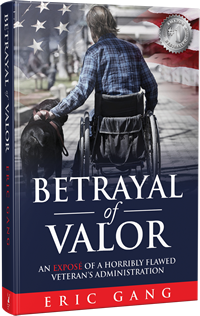If you are here because you have been denied veterans' benefits for PTSD, you are not alone.
In 2012, the VA claimed its own claims error rate was 14%. However, the VA’s own inspector general found a claims error rate of 38%. That means by even the VA’s own estimates they make mistakes in almost 4 out of 10 benefits claims cases!
Additionally, appeals represent a third of the VA’s pending disability claims which means 1 in 3 cases the VA is processing are veterans appealing a denial.

Contact Our Attorneys Now.
100% Free Consultation
The following information is provided to help you improve your chances of getting your VA benefits claim approved.
If you would like to talk to me, Eric Gang, an experienced VA disability attorney at no charge to you, call my office at (888) 912-1739 today.
Find Out What Your Benefits Should Be
Use our disability calculator
How Do I Get Veterans' Benefits for PTSD
To get veterans' benefits for PTSD, you need to establish a service connection between your PTSD disability and your time in service.
PTSD is unique among veteran disability types because of the importance placed on stressors in diagnosing PTSD.
Confidential
Evaluation
Want More PTSD
Related Content?
There are essentially 3 different approaches to proving stressors
Credible supporting evidence is important in getting approved for PTSD VA benefits.
But in practice, the "credible supporting evidence" requirement has been a major impediment to many Veterans receiving compensation for their PTSD diagnosis. Frankly, many things that happen in the service are never properly documented or recorded. As a result, it can be very difficult to prove that the stressor took place. Fortunately, in July 2010 the VA issued a new rule making it somewhat easier to prove that a stressor event happened during service. Under the new regulation, if a Veteran's claimed stressors are related to the Veteran's fear of hostile or military or terrorist activity then he could qualify for PTSD based on this as a stressor.
Additionally, in order to get VA benefits for PTSD, you might also need to get a private medical opinion to establish a connection between your service and your diagnosis.
Once you have established the stressors that qualify you for a PTSD diagnosis and you receive a service connection, the VA will determine your level of disability and award benefits accordingly.
Get a free case evaluationTo learn more about how to get veterans benefits for PTSD, read the articles listed at the bottom of this page.
What are PTSD Veterans Benefits?
Veterans benefits for PTSD are granted based on graduated disability ratings of 0%, 10%, 30%, 50%, 70% or 100%
Veterans who receive a disability rating of 0% do not receive disability benefits because there is little or no impairment. Disability benefit payments begin at 10% and increase at each rating level.
Veterans have a wide range of benefits available to them. They range from VA pension benefits (non-service connected) and VA compensation benefits - to vocational rehabilitation and grants for adapted vehicles, housing and equipment.
Call our office toll free at (888) 878-9350 for your free case evaluation for your PTSD claim.
Why did the VA deny my Veteran's benefit claim for PTSD?
-
The most common reasons why the VA denies benefits for PTSD are:
-
1
The VA denies the benefits claim on the grounds that the stressor is not verified and that the veteran did not provide enough information to verify the stressor.
-
2
The VA fails to submit the stressor information to the JSRRC, which is part of the government that is assigned the task of researching. The VA cannot simply do its own research and then deny the claim.
-
3
The VA also likes to deny PTSD claims on the grounds that you don't have a diagnosis of PTSD. In many cases, however, if you are not diagnosed with PTSD you may be diagnosed with depression or generalized anxiety. It would be an error for the VA to reject your PTSD claim on the grounds that you have depression instead. The VA would have to investigate whether service-connection is appropriate for depression or some other mental disability.
-
4
Another reason why the VA denies PTSD benefits claims is because many veterans make the mistake of re-filling PTSD benefits claims without any new evidence. or they submit evidence that is not really material to their PTSD.
In order to ensure the greatest degree of success in re-opened disability claims, we recommend that you look very carefully at the reason why the VA denied your claim last time.
For instance, if the VA denied your claim for PTSD disability benefits because there was no evidence linking your disability to service, then submitting more treatment records showing the severity of your PTSD disability is not going to help. In other words, if the issue is the lack of “linking” evidence, you should submit a medical report from a doctor stating that your disability is linked to service. On the other hand, if the reason they denied you before was because there was no evidence of a present disability, then submitting a new medical record showing a diagnosed condition could potentially aid in getting your claim reopened. The new evidence you submit should address one of the reasons why VA denied your benefits before.
Betrayal of Valor

An exposé of a horribly flawed veteran’s administration
How can a lawyer help me get PTSD benefits?
If you are reading this website now, VA has likely denied you multiple times. You may have sent your claim to your regional office. They denied it. You may have sent your claim to the Board of Veterans’ Appeals. They also denied it. Now you may be appealing your claim at the U.S. Court of Appeals for Veterans Claims (CAVC). Fortunately, the CAVC is outside of the Veteran Affairs system. In other words, you may be in a situation where you are no longer dealing with people in Veteran Affairs. What’s the difference? The people in Veteran Affairs are bureaucrats – people who sit behind desks and do paperwork. The people at the CAVC level are professional lawyers and judges hired by the government to look at your claim.
If you need to appeal to the CAVC, you are going up against highly skilled government lawyers who will argue that you don’t deserve benefits for your PTSD.
The U.S. government hires professional lawyers, many with 10 or 15 years of experience. These lawyers know the VA system backwards and forwards. They argue CAVC cases every day. What’s more, they are excellent attorneys – and they’re working as hard as they can to make sure you don’t get VA benefits. This is why, for you to have any chance of winning, you must have a skilled, experienced veterans benefits lawyer on your side.
When you hire a veterans benefits lawyer to help with your disability claim, your lawyer will help you...
-
1.

Discover weaknesses and holes in the Board’s decision
-
2.

Review the mountains of paperwork and prepare the best arguments
-
3.

“Fight fire with fire”, since they have professional lawyers working against you.
